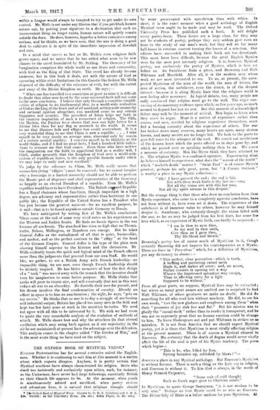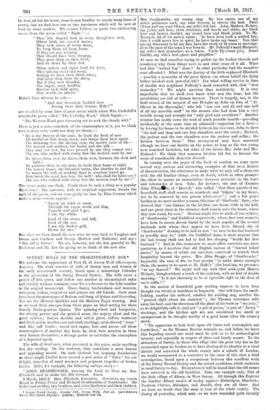THE OXFORD BOOK OF MYSTICAL VERSE.*
ENGLISH Protestantism' has for several c enturies suited the English- man. • Whether it is continuing to suit him at this moment is a matter about which experts disagree. Anyhow, it is pretty certain that Mystical reactions have always characterized his religion. Sects who dwell too insistently and exclusively upon ethics, such, for instance, as the Unitarians, have never had fsrge followings, essentially British As their Church life appears to be. At the moment, when youth is simultaneously adored and sacrificed, when poetry revives and adventure lives, it ie natural that religious. thought- should • The Oxford Root of lIfyetieol, Verse. • Chown by P. II. S. Nicholson And A. H. E. Lee. Oxford: at Ms University Press. Ida. net; India Paper, 7s. (hi. neLA bo more preoccupied with speculation than with ethics. la short, it is the exact moment when a good anthology of English Mystical rerse ought to be made and may be read. The Oxford
University Press has published such a book. It will delight every poetry-lover. These lovers are a largo class, for they may not be students of poetry, perhaps they very seldom give even an hour to the study of one man's work, but they will sit for many
half-hours in extreme content turning the leaves of a selection. Our editors have succeeded in making their book not too devotional. This must have been difficult, because the great English 'Mystics were for the most part intensely religious. It is, however, Mystical poetry, not exclusively the poetry of Mystics, which is here set before us. So Swinburne finds a place, and Browning and Walt Whitman and Masefield. After all, it is the modern men whose work we are most interested to see. To us, at present, the unex- pected Mysticism of the man of the world, the man of letters, the man of action, the unbeliever, even the sinner, is of the deepest interest—because it is along Mystic lines that the religious world is now feeling after assurance. In logical debate, too, many people are sadly convinced that religion must go to the wall. The eager can- vassing of documentary evidence upon which, so few years ago, so much seemed to depend has lost its zest. But this moment of acknowledged failure may well bo the moment of revival. Men begin to listen when they cease to argue. Hope is a matter of experience rather than reason, and men, startled by religious experience themselves, must feel a burning curiosity about the experience of others. The war has broken down many reserves, many hearts aro open, many desires known, and many secrets are no longer hid. Wo look to the poets to give full voice to the whispers of the soul. We search out revelations of the human heart which the poets offered us in days gone by, and which wo passed over as speaking nothing then to us. Wo crave a measure of certainty. Men like Myers think they hare attained to it. The religious Mystic is a confirmed optimist. Experiencing what he believes himself to experience, what does the " sorrow of the world "
which " worketh death" matter "Saint Paul " is of course Myers's greatest, perhaps his only great, poem, but "A Cosmic Outlook" is worthy a place in any Mystic collection :- " Oh I have guessed the end •, the end is fair.
Not with these weak limbs is thy last rip.e run; Not all thy vision sets with this low sun; Not all thy spirit swoons in this despair."
But the strange thing is that those who drew no conclusion from their Mystic experience, who came to a completely agnostic conclusion, have not been without it, have even set it down. The experience of the unbeliever is of immense value to others, however he may himself despise it. Swinburne, who certainly thought the vision faded with the sun, so far as may be judged from his best lines, has seine low here which, as an expression of Mystic faith, can hardly be surpassed :-
" I am in thee to save thee, As my soul in thee saith, Live thou as I gave thee, Thy life-blood and breath."
Browning's poetry has of course much of Mysticism in it, though certainly Browning did not impress his contemporaries as a Mystic. There are lines in " Paracelsus " which, for a definition of Mysticism, put any dictionary to shame :- " This perfect, clear percept-ion—which is truth. A baffling and perverting carnal mesh Binds it, and makes all error : and, To now, Rather consists in opening out a way Whence the imprisoned splendour may escape, Than in effecting entry for a light Supposed to be without."
From all great poets, we suppose, Mystical lines may be extracted ; but where so many great names are omitted one is surprised to find Walt Whitman, of whose greatness we make no doubt. He did do something for all who read him without mockery. Ile did, to use his own words, " toss the new gladness and roughness among them " when their "pennants of joy sink low and flat." But his mission was to glorify the "carnal mesh " rather than to render it transparent, and he was not so supremely great that no human emotion could be strange to him. To leave Shakespeare out and put Whitman in strikes us m mistaken. It is not from America that we should expect Mystical poetry, yet it is there that Mysticism is most vitally affecting religion at the present moment. There is of course a Mystical element in Emerson. His certainty that the death of dogma would never vitally affect the life of the soul is part of his Mystic tendency. The poem which begins- " This is he, who, felled by foes, Sprung harmless up, refreshed by blows !"— deserves a place in any Mystical anthology.. But Emerson's Mysticism is without fervour. There is such a thing as the lyric cry in religion, and Emerson is without it. To him God is always, in the worth of Henry Bernard Carpenter, "Some unit of cold thought Such as Greek sages gave to Christian saints."
In Mysticism, to quote George Santayana, "it is not wisdom to be only wise." Perhaps no true Mystic could he as wise as Emerson. The Divine'folly of-Blake is a better medium for pure- Mysticism. Ai
his best, all but his worst, verse is now familiar to nearly every lover of poetry, but we find here one or two specimens which will be new at least to some readers. Wo cannot forbear to quote two enchanting verses from the poem called " Night " :— • • • " They [the Angels] look in every thoughtless nest, Where birds are cover'd warm ; They visit caves of every beast, To keep them all from harm.
• If they see any weeping That should have been sleeping, They pour sleep on their head, And it down by their bed.
When wolves and tigers howl for prey, They pitying stand and weep; Seeking to drive their thirst away, And keep them from the sheep. But if they rush dreadful, The angels, most heedful, Receive each mild spirit, New worlds to inherit."
Blake's lines wherein he asks — " And was Jerusalem blinded here Among these dark Satanic Mills " are recalled by some lines of great merit which adorn Miss Underhill's remarkable poem called " The Uxbridge Road," which begins :— " The Western Road goes streaming out to seek the cleanly wild."
There is just a note, somehow, of the commonplace in it, yet we think even a stern critic could not deny its charm :- " He is the Drover of the soul ; he leads the flock of men All wistful on that weary track, and brings them back again. The dreaming few, the slaving crew, the motley caste of life— The wastrel and artificer, the harlot and the wife — They may not rest, for ever pressed by one they cannot see : The one who walked with starry feet the western road by me.
He drives them cast, he drives them west, between the dark and light ; lie pastures them in city pens, he leads them home at night. The towery trams, the threaded trains, like shuttles to and fro To weave the web of working days in ceaseless travel go. I low harsh the woof, how long the weft ! who shall the fabric see ? The one who walked with starry feet the western road by me ! "
The verses make one think. Could there be such a thing as a popular Mysticism ? The question, with its sceptical suggestion, breaks the spell of the poem, and wo turn gladly to 'ines by Bliss Carman which make a more esoteric appeal :— " Lonely as wind or snow, Through the vague world and dim, Vagrant and glad I go ; I am thy whim.
Lord of the storm and lull, Lord of the sea, I am thy broken gull, Blown far ales."
But when we have drunk the new wine we turn back to Vaughan and Donne and Crashaw and George Herbert and Traherne, and say : " The old is better." We are, however, not the less grateful to Mr. Nicholson and Mr. Lee for giving us to drink of the new also.



































 Previous page
Previous page